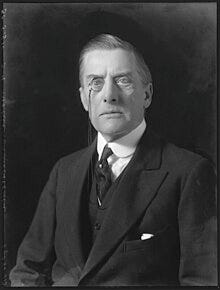“I think that you will all agree that we are living in most interesting times. I never remember myself a time in which our history was so full, in which day by day brought us new objects of interest, and, let me say also, new objects for anxiety.”
Joseph Chamberlain was a successful manufacturer of screws, Mayor of Birmingham, founder and first Chancellor of the University of Birmingham, then an MP and Secretary of State for the Colonies (a role that, contrary to the prejudices of Londoners, did not include Birmingham). Resplendent with his monocle and orchid buttonhole, Chamberlain was an elegantly-attired charging rhinoceros determined to either remake Britain to his own vision or break the country in the process. While he might have been a Midlander, he was definitely not “mid” in any way, shape, or form.
It was during an 1898 speech in Liverpool that he made the comment about “interesting times” and the new objects they bring. And if anyone was making the times interesting then it was Joseph Chamberlain. Whether it was blocking Home Rule in Ireland, starting various Boer Wars, or advocating for tariffs; the only thing that stopped Chamberlain was a stroke shortly after his 70th birthday. Winston Churchill wrote of him: “incomparably the most live, sparkling, insurgent, compulsive figure in British affairs… 'Joe' was the one who made the weather”. And the weather is not always pleasant or safe.
Decades passed. Chamberlain’s son Austen also went into politics (as, eventually, did another of Chamberlain’s children, Neville). Austen was very much the image of his father - down to the monocle and the orchid buttonhole. But the copy is not the same as the original. While Austen rose to high office, Churchill said of him: “he always played the game, and he always lost it”.
Austen’s signature achievement was to negotiate a series of treaties between Germany, France, Great Britain, Belgium, Italy, Poland and Czechoslovakia in 1925 to stabilize post-WW1 Europe. For this, Austen was given the Nobel Peace Prize. Then in March 1936, Nazi Germany broke Austen’s precious treaties by remilitarizing the Rhineland and no one stopped them.
At the annual meeting of Birmingham Unionist Association the same month, Chamberlain junior: spoke of the “grave injury” to collective security by Germany’s violation of the Treaty of Locarno. “It is not so long ago that a member of the Diplomatic Body in London, who had spent some years of his service in China, told me that there was a Chinese curse which took the form of saying, ‘May you live in interesting times.’ There is no doubt that the curse has fallen on us… We move from one crisis to another. We suffer one disturbance and shock after another.”
According to the Chinese, there is no such curse (although the Japanese were making China very interesting at the time). Chamberlain seems to have made that bit up. He may have been channeling his late father. Although Chamberlain senior was the one doing the interesting, and Chamberlain junior was the one having the interesting done to him. Austen did not spend long in these interesting times. Within a year, he was as dead as his treaties. The world got gradually more interesting until there were full-blown outbreaks of fascinating in 1939 and captivating in 1941. By 1945, everyone was all interested out. Millions had been interested to death. So boring became the order of the day.
“May you live in interesting times” doesn’t read like a Chinese saying (curse or otherwise) - with their precision, lyricism and references the tangible world. Chinese 成语 and 歇后语 are full of references to emperors, dumplings, horses, rivers, etc. Biting sarcasm masked with bland understatement is far more English than Chinese.
Many people seem to crave interesting times under the assumption that they will be Joe Chamberlain. Fewer seem to have considered that they might actually be Austen.
How interesting are your times?
More info: https://quoteinvestigator.com/2015/12/18/live/




